- Home
- John Boyne
Stay Where You Are and Then Leave Page 5
Stay Where You Are and Then Leave Read online
Page 5
“It’s not about your father,” said Margie, shaking her head. “Alfie, we’ve had this conversation before. He’s on a secret mission for the government, I told you that. That’s why he can’t get in touch with us anymore. It’s why he doesn’t write and why we can’t write to him.”
Dad’s dead, thought Alfie.
“I thought you understood all about that?” continued Margie, her voice rising a little as Alfie set his jaw and felt his teeth grinding against each other. Dad’s dead. He closed his eyes, and in his head he heard the sound of a train pulling into a station, the noise of its engines drowning out everything that his mother was saying … dead-Dad’s-dead-Dad’s-dead-Dad’s-dead … Her lips were still moving; she was still talking, he knew she was, but he couldn’t hear her. He was blocking out every sound and could only hear those two words repeated over and over in his head.
“Alfie, stop it!” cried Margie, pulling his hands away from his ears, and he opened his eyes now and swallowed hard. “What’s the matter with you, anyway?”
“I was thinking about something, that’s all.”
“What were you thinking about?”
“Dad.”
Margie sighed. “Alfie, if you want to talk about your father, we can talk about your father. Is that what you want?”
“Tell me the truth about him.”
“I’ve told you the truth.”
“I’m not a baby,” insisted Alfie. “Tell me the truth.”
Margie hesitated; for a moment it looked as if she really was going to tell him the truth, but the sound of Mr. Asquith’s hooves passing down Damley Road, his head turning automatically as he passed number twelve, pulled them both out of the moment and Alfie knew that there was no point in asking.
“Tell me your news, then,” he said at last.
Margie shook her head. “Oh, Alfie,” she said with a sigh. “I don’t know that I have the energy now.”
“Tell me,” he insisted.
“I’ve got a job,” she said, shrugging her shoulders. “At the hospital. I’m to be a Queen’s Nurse.”
“What’s that?” asked Alfie, frowning.
“You read the paper. I know you do,” she said, not knowing that Alfie only looked at the newspaper every day to read the numbers.
14278.
“There are so many soldiers coming back from the front with terrible injuries,” continued Margie. “And they need more nurses to look after them. I have to do my bit, Alfie. You can see that, can’t you? I’ve always wanted to find something I might be good at. Maybe this is it. I think about your dad and—” She stopped speaking for a moment and bit her lip, then shook her head, changing tack. “I can be of use, Alfie. You understand that, don’t you? The more people who are of use, the quicker the war will come to an end.”
“The war will never come to an end,” shouted Alfie, leaning forward in his seat now. “It’s going to go on forever.”
“That’s not true,” said Margie. “It has to end one day. Wars always do. The new ones can’t start if the old ones don’t end,” she added, smiling a little, but Alfie wasn’t in the mood for jokes. “Anyway, I’ve been offered six weeks’ training at the hospital and then a job after that—shift work unfortunately, so there’ll be a few changes around here for a while. You’re going to have look after yourself a bit more. You can do that, can’t you? Granny Summerfield is only across the road anyway if you want to go over there.”
Alfie thought about it. He didn’t much like the idea of looking after himself. He wanted things to be back the way they used to be, when Georgie and Margie were looking after him, and Granny Summerfield was always stopping by for a bit of a gossip, and Old Bill Hemperton next door would rat-a-tat-tat on the door and give Alfie a ha’penny to go and fetch his paper for him, and Kalena Janáček was still his best friend and not a person of special interest and hadn’t been taken away for internment.
“We need the money, Alfie, that’s the truth of it,” said Margie when he didn’t say anything.
“But you’re already taking in washing,” said Alfie.
“Don’t remind me. I’ll have to do all that in the middle of the day, between shifts.”
“And when will you sleep?”
“Oh, I’ll sleep when I’m—” She stopped herself suddenly, her cheeks flushing scarlet. “I don’t have any choice, Alfie. Times are tight, you know that.” She hesitated and raised her voice in exasperation. “We don’t have any money, Alfie! We’re barely getting by as it is. Granny Summerfield has said we can go and live with her, but I won’t do that. This is our home, and while I have breath in my body I won’t take it away from you when you’ve already lost so many other things. Anyway, how am I supposed to keep you in sweets if I don’t work?” She smiled, hoping that he’d smile back.
“I don’t need sweets,” said Alfie. “I can give them up. There aren’t as many now anyway. Almost none of the shops stock them.”
“We need food,” she said then. “Alfie, we’re perilously close to penury. Perilously close.”
Alfie opened his eyes wide. He had no idea what perilously close to penury meant, but it didn’t sound good.
“If I go out to work, and take in Mrs. Gawdley-Smith’s washing, and maybe take a few extra night shifts, then we can eat. If I don’t, then we can’t. It’s as simple as that. Food doesn’t grow on trees, you know.”
“It does actually,” said Alfie. “Some of it. The rest grows in the ground.”
Margie smiled and even laughed a little, which made Alfie happy. It had been a long time since he’d made his mother laugh. “Well, that’s true,” she said. “But you know what I mean.”
In the end, they’d had a long talk about the hospital and the hours she would have to work, and Alfie promised that he wouldn’t get into any trouble and that he’d go to school every day, which Margie said was a sign that he was growing up.
“You’ll be a fine man one day, Alfie Summerfield,” she told him, kissing him on the top of his forehead. “Just like your father. He’d be proud of you if he were here with us now.”
But he wasn’t with them, of course. He didn’t write, he didn’t send telegrams; he didn’t come home on leave like Jack Tamorin from number twenty or Arthur Morris from number eighteen. Margie insisted that his dad’s secret mission would bring the war to an end more quickly, but Alfie didn’t believe a word of it.
He knew that his father was dead.
* * *
Alfie stole Mr. Janáček’s shoeshine box for one reason only: so that he could go out to work like Leonard Hopkins had and help his mother out. She was doing her bit; it was time he did his bit too.
The next morning was a Wednesday so there was no need to go to school. (It wasn’t reading or history that day, after all.) Alfie waited until Margie left for her first week’s training at the hospital and then took the box out of the wardrobe, opened it to make sure that everything was still in place, had a wash, got dressed, ate some breakfast, and left the house.
Damley Road was only a short walk from King’s Cross, and Alfie made his way along the familiar streets, switching the box from his right hand to his left whenever it grew too heavy. He felt like a man of the world, a working man just like his dad had once been, getting up early to ride the milk float. When he passed other working men on the street, he felt an urge to tip his cap to them, but didn’t do so in case it made him look stupid.
As he stepped inside the station, he felt a great wave of emotion overtake him. The last time he’d been here—the only time he’d been here—was when Georgie had taken him a few days after he’d signed up. The station had been very busy then. Newspaper boys were everywhere—it was said that during July 1914, circulation increased sixfold as everyone wanted to find out what might happen to them next—and there were hundreds of people boarding and leaving the trains. The noise of the steam engines was deafening and the station itself was filled with a smog as bad as any of the London pea-soupers. Georgie wasn’t wearing his sold
ier’s uniform that day. It was hanging in his wardrobe at home. He hadn’t put it on again since he’d stepped into the front parlor and surprised them all.
“Do you know,” said Georgie, standing in the concourse and looking around at the platforms, staring at the height of the station ceiling and listening to the sound of the conductors’ whistles, “I used to think I might like to be a train driver. I tried for a job on the London-to-Edinburgh line, but I didn’t get it.”
“Why not?” asked Alfie, looking up at his dad.
“They said I wasn’t a good fit,” he replied with a shrug. “Whatever that meant. They’re a posh old lot, them train drivers. They think they’re better than everyone else on account of how they get to wear a uniform all the time. But they’re not.”
“You’re going to wear a uniform now too,” said Alfie, and Georgie laughed a little and tousled the boy’s hair even though Alfie hadn’t meant it as a joke.
“Yes, I expect I am,” he said. “Hold on now—since we’re here there’s a bit of business I need to take care of.”
They walked over toward the ticket counter, where lots of people were queuing up for tickets, but at the end of the row were three desks lined up on the platform without railings in front of them, each one manned by an officer, leaning over ledgers and making notes alongside some of the entries.
“Afternoon,” said Georgie, lighting up a cigarette and taking a drag from it as he approached the man at the center table, who was about ten years older than he was and had dark-black hair, parted neatly at the side and with so much hair cream in it that his comb had left teeth marks like a freshly plowed field. Alfie heard a wolf whistle and turned around to see Leonard Hopkins, kneeling by his shoeshine box, leering at a girl who turned in surprise and smiled before being dragged away by her mother.
“Can I help you?” said the man behind the desk.
“The name’s Georgie Summerfield,” said Georgie. “I was told to come along to organize my transport.”
“You’re a new recruit, are you?”
“That’s right.”
The man behind the desk nodded but wore a very serious expression on his face. He glanced at the men on either side of him, who exchanged an amused look before shaking their heads and getting back to their ledgers.
“All right then, son,” said the man in the middle. “You’re new at all this, so I’ll assume that you don’t understand the way we do things around here. First things first: take the cigarette out of your mouth and put it out.”
Georgie stared at the man, and Alfie stared at Georgie. Something changed on his dad’s face—a sudden realization that life was different now than it had been a few days before. He did what he was told, tossing the cigarette onto the ground and crushing it beneath the heel of his boot. Alfie noticed a slight tremor in his hands as he did so.
“Now stand up straight and look ahead, there’s a good fellow. You’re not an animal in the jungle. Posture. At all times, posture.”
Georgie adjusted his stance, standing to his full height, shoulders back, eyes looking straight ahead. Beside him, Alfie did the same thing. His head came up to his dad’s waist.
“That’s better. Now let’s try this again, shall we? I think what you meant to say was, ‘Good afternoon, sir.’”
“Yes, sir,” said Georgie.
“Your name again?”
“Georgie Summerfield.”
The sergeant raised an eyebrow and put his pen back on the table, staring at Alfie’s dad with an irritated expression on his face.
“Georgie Summerfield, sir,” whispered Alfie.
“Georgie Summerfield, sir,” repeated Georgie in a quiet, resigned voice.
The sergeant nodded and leafed through a book, running his finger along a list of names. “Damley Road?” he asked, looking up.
“That’s right, sir.”
“You’re in luck, Summerfield. You’ve got a few days yet. Wednesday morning. Eight a.m. transport from Liverpool Street. Aldershot Barracks. Basic training for eight weeks. Bring this with you on the morning”—he handed a ticket across—“and you’ll see our lot soon enough on platform four. 14278, that’s your number. Don’t be late, there’s a good chap. We call that desertion.”
“Right you are, sir.”
The sergeant looked at Alfie. “And who’s this blighter, then?” he asked.
“That’s my boy, sir. Alfie.”
“Proud of your old man, are you, Alfie?” asked the sergeant, but Alfie didn’t say anything. “Well, you will be,” he went on, dismissing them both now. “One day.”
“I thought we came to look at the trains,” said Alfie when they were walking home.
“We did,” said Georgie.
“No we didn’t,” said Alfie, pulling his hand free of his dad’s as they walked along.
* * *
Now Alfie was back in King’s Cross for the first time since that day. He looked around, remembering where the sergeant had sat, but there were no desks there now, although the location of the ticket counters hadn’t changed. There were a lot of soldiers to be seen making their way across the concourse. Some were waiting in small groups beside the tea shop, their rucksacks on the ground beside them. Others were climbing down off trains and looking around for people they recognized. The rhythmic noise of the engines was as bad as ever—dead-Dad’s-dead-Dad’s-dead-Dad’s-dead—and Alfie wondered how the people who worked here could bear it.
He noticed one young Tommy standing in the center of a platform with a bag on his back and a deep red scar running down the side of his face. He was about twenty years old, Alfie thought, and had an expression on his face that was difficult to define; it was as if he’d been visited by a ghost but didn’t know how to tell anyone in case they locked him up and threw away the key. A moment later, two older people, a man and a woman—his parents, Alfie was certain of it—ran toward him, and when he saw them his rucksack fell off his back and his face collapsed. He looked as if he was about to fall over, but before he could, his mother and father were on either side of him, holding him up, and he was crying on their shoulders, great heavy sobs, as they wrapped him up between their bodies, protecting him from the world, rubbing his hair and whispering in his ears. When they started to walk away, the boy remained between them, and they stood as close as they could without all falling down in a muddle. The father’s arm was wrapped around his son’s shoulders; the mother’s clasped tight around the boy’s waist. Alfie watched them for a long time until he decided he shouldn’t stare like this, and then he turned away.
He looked around and was pleased to see that there were no other shoeshine boys in King’s Cross. Leonard Hopkins was long gone, and no one, it seemed, had come to take his place. He chose a point by a pillar that was equidistant from the ticket counter on his left and the platforms on his right and the tea shop in the corner, and sat down on the ground, opening Mr. Janáček’s box, taking out his brushes, cloths, daubers, and polishes, and closing the lid. He took his cap off his head and placed it upside down on the ground next to him before throwing the loose change from his pocket—three ha’pennies—into it to make it look like he’d already started. And then he looked up and shouted at the top of his voice:
“Shoeshine! Get your shoes shined here!”
* * *
Later that day, when he got home, he found Margie having a nap in the front parlor; she looked exhausted. He ran upstairs to his room and put the box in the back of his wardrobe before coming down to the kitchen and washing his hands with carbolic soap. When he was finished he gave them a sniff, but they still smelled of polish so he did it all over again. It wasn’t much better, but there was nothing he could do about it; they were as clean as he could get them for now. His back hurt a little from leaning over all day and the muscles in his arms were sore. There might have been a war going on, but there was still a surprising number of people who wanted their shoes to look good.
He looked around and felt his heart sink with what he saw.
All the chairs were covered with Mrs. Gawdley-Smith’s pillowcases, and the line outside in the yard held her bedsheets and some funny-looking undergarments. Margie would never smell the polish on his hands after all. The place smelled too much like a laundry.
He found his mother’s purse in the handbag that was sitting in the corner and took it out, opening the clasp and looking inside. There wasn’t much money there. Reaching into his pocket, he took out all his earnings from the day and dropped most of them inside—enough money that she’d be pleased to find it there but not so much that she’d question where it had appeared from—before taking the rest back up to his bedroom, where he hid it in a box at the back of his sock drawer for a rainy day. Then he collapsed on his bed and closed his eyes.
It was still early evening, the sun was shining outside, but Alfie was asleep on top of his bed while Margie was snoring in the broken armchair in front of the fireplace.
It had never been like this before the war began.
CHAPTER 5
WHEN THIS LOUSY WAR IS OVER
Alfie started work at eight o’clock in the morning, one of the busiest times of the day at King’s Cross. He took up his usual position with a view of the platforms, the ticket counter, and the tea shop, pulled over a seat for his customers, threw his upturned cap on the ground, and looked around for his first shine of the day. While he waited, he took Robinson Crusoe from his pocket and picked up where he’d left off the night before. The edges had grown a little scruffy, the paper was a little torn, but the words were all intact.
“Hello, Alfie!”
He looked up to see Mr. Podgett, a local bank manager who got his shoes shined every week, standing before him.
“Hello, Mr. Podgett,” replied Alfie.
“The usual, please,” he said, sitting down and unfolding his newspaper as he placed one foot on the footrest and let out a great sigh of comfort. Alfie took a look at his dark-brown shoes; they were a little dusty at the tips and had suffered a number of scuffs since the previous week. “Cold morning, isn’t it? Well, it is almost November, I suppose. Can’t expect a heat wave.”

 Beneath the Earth
Beneath the Earth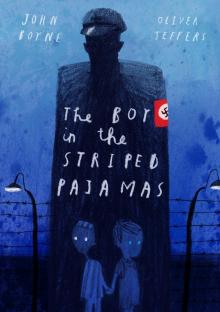 The Boy in the Striped Pajamas
The Boy in the Striped Pajamas Next of Kin
Next of Kin The House of Special Purpose
The House of Special Purpose A Ladder to the Sky
A Ladder to the Sky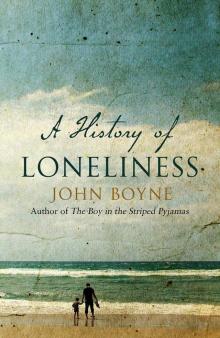 A History of Loneliness
A History of Loneliness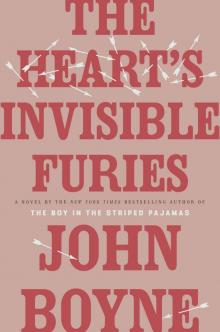 The Heart's Invisible Furies
The Heart's Invisible Furies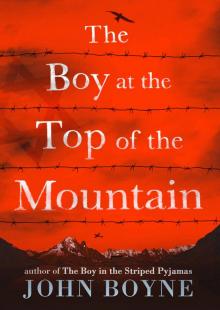 The Boy at the Top of the Mountain
The Boy at the Top of the Mountain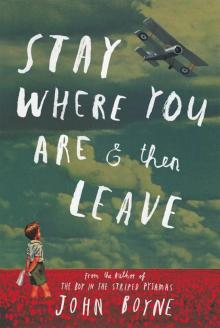 Stay Where You Are and Then Leave
Stay Where You Are and Then Leave Crippen: A Novel of Murder
Crippen: A Novel of Murder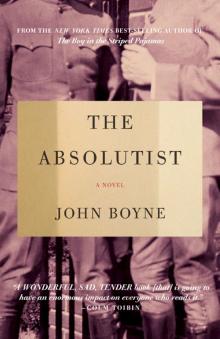 The Absolutist
The Absolutist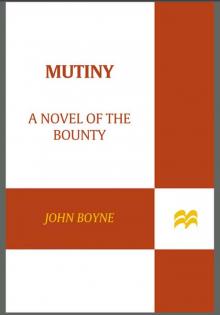 Mutiny: A Novel of the Bounty
Mutiny: A Novel of the Bounty A Traveler at the Gates of Wisdom
A Traveler at the Gates of Wisdom The Congress of Rough Riders
The Congress of Rough Riders The Thief of Time
The Thief of Time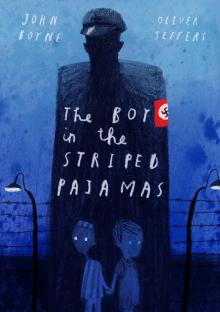 The Boy in the Striped Pajamas (Deluxe Illustrated Edition)
The Boy in the Striped Pajamas (Deluxe Illustrated Edition)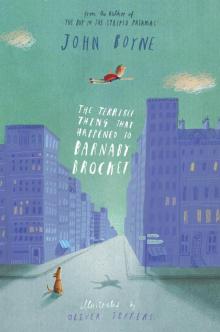 The Terrible Thing That Happened to Barnaby Brocket
The Terrible Thing That Happened to Barnaby Brocket The Boy In The Striped Pyjamas
The Boy In The Striped Pyjamas Crippen
Crippen